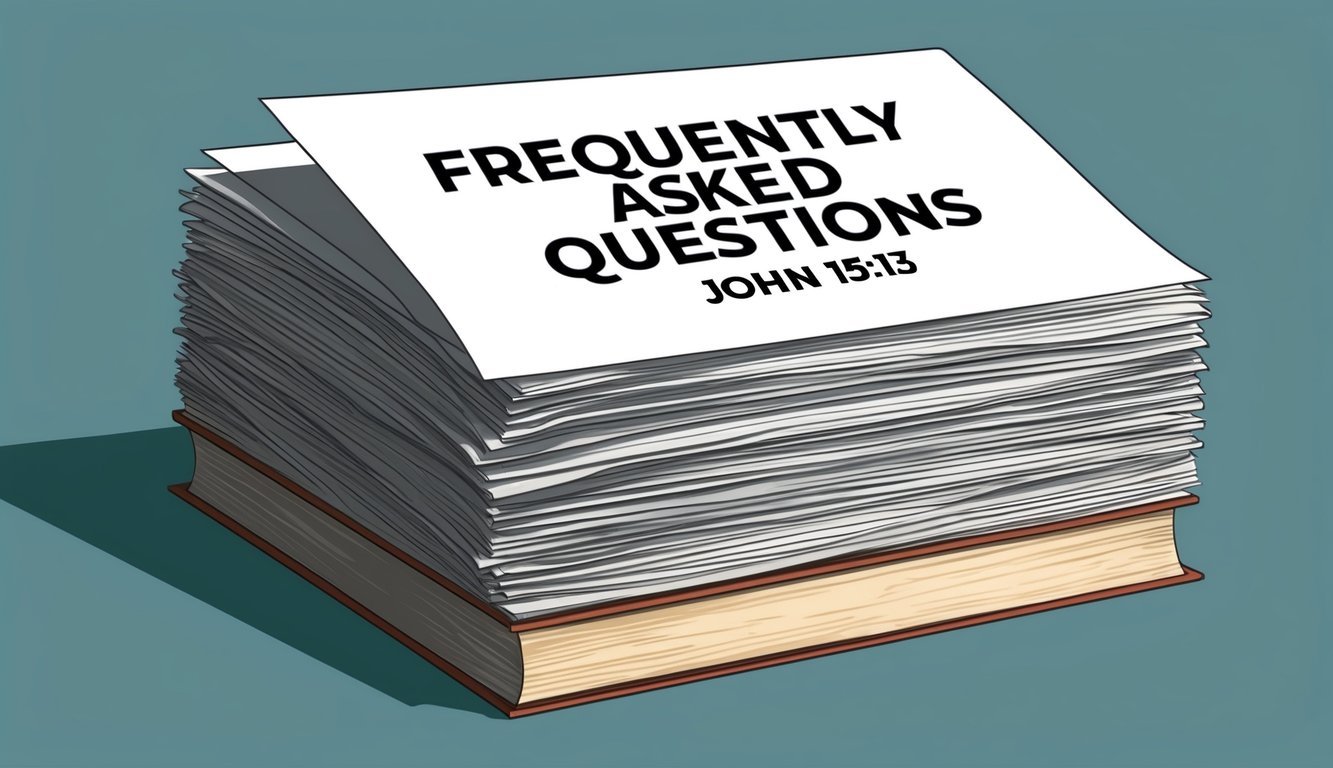Don’t Miss Out On This Unique Astrological Opportunity
Are you tired of spinning your wheels and getting nowhere? Simply put, you’re out of sync: you’re out of alignment with your astral configuration.
But: there’s a kind of map that can help you reclaim your alignment. Think of it as your own personal blueprint to success and happiness: a blueprint that will help you live your most amazing life.
Get started here.
“Greater love has no one than this: to lay down one’s life for one’s friends.” These powerful words from John 15:13 in the Holy Bible hold a profound message about sacrifice and love.
You may wonder why this specific verse resonates so much with people. The verse speaks to the idea of ultimate love being expressed through selflessness and putting others before oneself.
You might find it interesting that John 15:13 is often linked with stories of heroes and self-sacrifice.
In various translations of the Scripture, the message remains largely the same, always pointing to the depth of true love.
This love goes beyond words and is evident in actions that show commitment and care, just as Jesus did for humanity.
As you explore the further implications of this verse, consider how its teachings on love can be applied in everyday life.
Whether through small acts of kindness or large gestures, living out the message of John 15:13 requires thoughtful attention to how you relate to others around you.
Asking questions and seeking resources can further guide your understanding.
Key Takeaways
- John 15:13 emphasizes the theme of ultimate love through sacrifice.
- Scripture interpretations stress action over words in living out this love.
- Applying these lessons can enrich daily relationships and community bonds.
The Meaning of John 15:13
John 15:13 speaks to the deep love and sacrifice that is seen when someone is willing to lay down their life for their friends.
The verse emphasizes the strength of friendship and love, demonstrating the ultimate act of selflessness.
Historical Context
In the time of Jesus, the concepts of friendship and loyalty were highly valued.
The Roman culture saw acts of loyalty, often displayed through sacrifice, as signs of true friendship.
When Jesus spoke about laying down one’s life for friends, His disciples would have understood this as the greatest act of love.
By saying “No Greater Love,” Jesus highlighted the depth of His commitment to those He calls “My Friends.”
Jesus set an example for sacrificial love.
Romans valued loyalty, yet Jesus elevated this by offering His life. He embodied love by choosing to give Himself for others.
Contemporary Application
Today, John 15:13 still inspires selfless actions among many.
It’s a call to put others first, showing love beyond words.
When you hear “No Greater Love,” think about helping those you care for.
Being “My Friends,” in a modern sense, means treating others with respect and kindness, sometimes making personal sacrifices.
The Gospel teaches us that true friendship involves being there for each other.
You can apply this principle when you help friends in need or stand by them during tough times, reflecting the spirit of love and friendship Jesus described.
It’s about being willing to “Lay Down One’s Life” in different ways, offering time, effort, and compassion.
Biblical Interpretations and Translations
John 15:13 is a well-known verse that speaks of love and sacrifice.
Different Bible versions have translated this verse while keeping the core message intact, but with slight variations in wording.
Scholars have explored this passage to uncover its deeper meanings and context.
Comparing Different Versions
Various translations of the Bible offer slightly different wordings of John 15:13.
In the King James Version (KJV), the verse reads, “Greater love hath no man than this, that a man lay down his life for his friends.” This formal language captures the essence of selfless love.
In the New International Version (NIV), it says, “Greater love has no one than this: to lay down one’s life for one’s friends.” The modern language is more relatable while maintaining the original meaning.
Similarly, the English Standard Version (ESV), New Living Translation (NLT), and the New American Standard Bible (NASB) offer unique translations but stay true to the original Greek text about sacrificial love.
You can explore these translations further on resources like Bible Gateway, where side-by-side comparisons are available.
Scholarly Perspectives
Scholars have offered several interpretations of John 15:13, considering the historical and cultural context of Jesus’ time.
They analyze the Greek word “agape” used in the text, which describes a selfless type of love that goes beyond familial or friendly bonds.
Some scholars suggest that this verse is central to Jesus’ message about love and sacrifice.
By stating, “lay down one’s life for one’s friends,” it highlights the depth and breadth of true commitment.
This interpretation aligns with the overarching themes within the Bible, emphasizing love as one of the greatest commandments.
Different scholars might focus on the implications of this selfless love in today’s world, considering how it applies to personal relationships and community service.
Such insights help you understand how this ancient text holds relevance today.
Living Out the Teaching

Living out the teachings of John 15:13 involves demonstrating acts of love and sacrifice, and fostering close-knit communities.
These elements help bring the teachings of this verse into everyday actions.
Acts of Love and Sacrifice
John 15:13 emphasizes the value of sacrificial love.
You are called to care deeply for others, sometimes even prioritizing their needs over your own comfort.
This isn’t just about grand gestures but can also include everyday acts, such as helping a friend in need or offering emotional support to someone going through a tough time.
Being an example of love involves following the command to “love one another” as taught in the verse.
Even small acts can reflect the teachings of the Father and show your caring nature.
By adopting a service-first mindset, you can embody the servant leadership that Jesus taught, demonstrating love that moves beyond words into real actions.
Fostering Community
Building a community rooted in love aligns perfectly with the message of John 15:13.
Create spaces where you and others feel supported and valued.
When we embody selflessness and compassion, we foster deeper connections that strengthen the bonds within our community.
The James 3 impact on communities highlights the power of our words and actions in either building up or tearing down those around us.
By choosing kindness and understanding, we create an environment where everyone feels uplifted and empowered.
Engage with people in your community by organizing small gatherings or volunteer events.
These actions promote a sense of belonging and mutual care.
Love each other by sharing skills and talents, further enriching the community and strengthening bonds.
The goal is to foster a collective responsibility, inspired by the Father’s love.
By nurturing these relationships, you help create a radiant community that reflects the core values taught in the scriptures.
Resources and Further Study

When you want to learn more about John 15:13, exploring different Bible versions can be helpful.
Consider reading the New Century Version or the God’s Word Translation.
These versions might give you a clearer understanding of the verse.
Both translations are known for their readability and clarity, making it easier to grasp the meaning of complex passages.
If you’re studying the Acts 16 journey of Paul, these versions can help highlight key details and bring the events to life.
Comparing different translations can also enhance your understanding and provide a well-rounded interpretation of the scripture.
If you are interested in studying the cultural context, the Cultural Backgrounds Study Bible is a great resource.
It’s designed to help you see how the culture and history during Jesus’ time can influence the text.
The Biblical Theology Study Bible dives into the theological aspects.
It can help you explore the themes in John 15:13, and how they relate to the rest of the Bible.
For those who like to read Jesus’ words highlighted, the Red Letter Edition is perfect.
This edition highlights the words spoken by Jesus, emphasizing His teachings.
Here are some study guides and commentaries you might find useful:
- David Guzik’s Study Guide for John 15 – Offers verse-by-verse insights.
- Clarke’s Commentary – Explains the significance of laying down one’s life for friends.
Consulting various versions and commentaries, such as the New King James Version and the Lexham English Bible, can also deepen your study.
Each version offers its unique translation style and can help you grasp the message more fully.
Enjoy exploring these resources to enrich your study of John 15:13!
Frequently Asked Questions

John 15:13 highlights the great depth of love, as shown by laying down one’s life for friends.
This verse is widely appreciated for its portrayal of ultimate sacrifice and love.
What is the meaning behind John 15:13 in the New Testament?
John 15:13 speaks about the highest form of love, which involves selflessness and sacrifice.
It reflects Jesus’ act of giving His life for others, establishing a benchmark for love.
How is John 15:13 depicted across different versions of the Bible, such as KJV, NKJV, and NIV?
Different versions of the Bible, like the KJV, NKJV, and NIV, may vary slightly in wording but convey the same meaning.
They emphasize the theme of sacrificing one’s life for friends as the greatest expression of love.
Can you explain the context of John 15:13 within the surrounding passages?
The context of John 15:13 is part of Jesus’ farewell discourse to His disciples.
It follows His teachings on abiding in love and precedes instructions on being chosen and appointed to bear fruit.
This passage emphasizes mutual love and service.
What interpretations do different denominations, such as Catholicism, have regarding John 15:13?
Different Christian denominations see John 15:13 as an expression of divine love.
In Catholicism, it’s often linked to Christ’s sacrifice and the call for believers to love others selflessly.
How has John 15:13 been used in discussions about self-sacrifice and love?
John 15:13 is frequently cited in discussions on self-sacrifice and altruism.
It inspires acts of courage and compassion, illustrating the profound impact of giving oneself for others’ well-being.
What are some artistic representations of John 15:13, such as in tattoos or religious art?
Artistic representations of John 15:13 range from tattoos to religious paintings.
These artworks often symbolize love and sacrifice.
They use imagery of crosses, heart symbols, or scenes from the life of Christ to convey the message of the verse.



